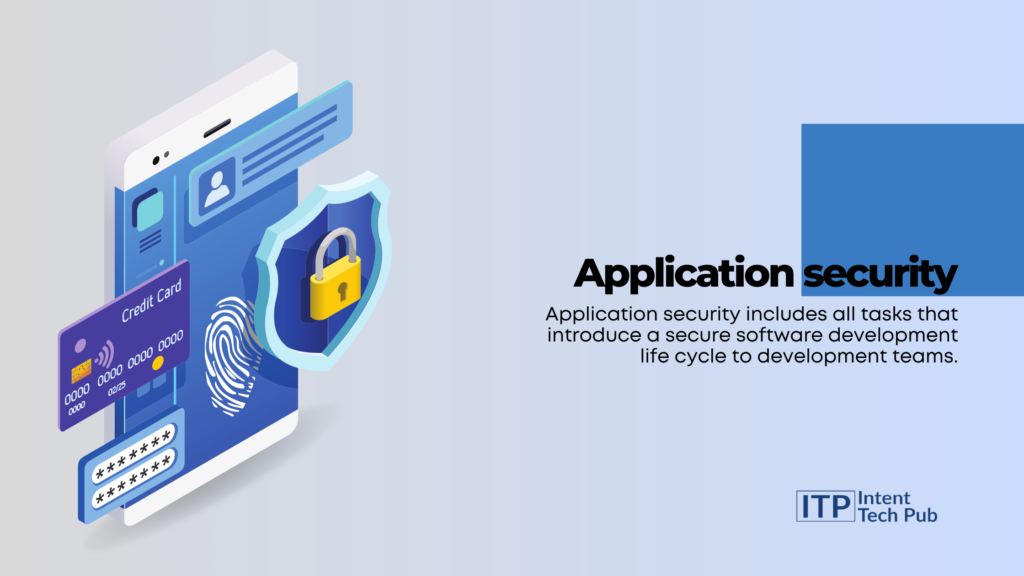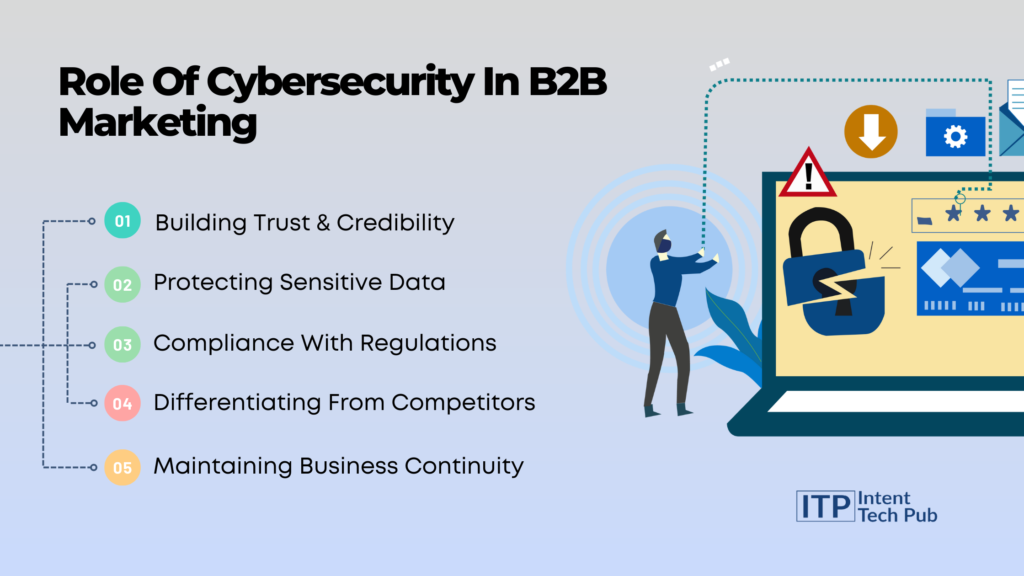or call: +1 (845) 347-8894

or call: +1 (845) 347-8894
or call: +1 (845) 347-8894

In the realm of B2B marketing, cybersecurity plays a crucial role that extends beyond mere data protection. It involves building trust with clients, adhering to regulatory requirements, and gaining a competitive edge. This article aims to provide an in-depth analysis of the diverse functions of cybersecurity in B2B marketing.
In today’s interconnected and vulnerable digital ecosystem, businesses must prioritize cybersecurity in the B2B context to fortify their digital transformation and establish themselves as trustworthy partners. Let’s begin with an introduction to the term ‘Cybersecurity’.
“Cybersecurity isn’t easy, but it comes down to three basic principles-
Protect, Detect & Respond”
Cybersecurity protects digital systems and data from unauthorized access, use, disclosure, disruption, modification, or destruction. It is a vital aspect of modern-day technology that protects sensitive information from potential threats. Cybersecurity encompasses a diverse set of strategies, tools, and protocols aimed at safeguarding against digital threats and preserving the confidentiality, integrity, and accessibility of data.
When it comes to safeguarding digital systems and networks, cybersecurity involves a range of components and strategies. These may include:
It is a crucial aspect of protecting computer networks from unauthorized access and attacks. To achieve this, you can employ various measures, including the use of firewalls, intrusion detection systems (IDS), and virtual private networks (VPNs).
These measures work together to secure the network and detect and prevent breach attempts. By implementing these security measures, organizations can safeguard their networks and protect sensitive information from falling into the wrong hands.
It is one of the crucial aspects of protecting sensitive data and information. This is achieved through various measures such as encryption, access controls, secure storage, and secure data transmission protocols.
By implementing these security measures, organizations can ensure that their confidential information remains safe and secure from unauthorized access or theft.
It is a crucial aspect of safeguarding individual devices such as computers, laptops, and mobile devices from harmful malware, viruses, and other malicious software. Organizations use antivirus software, endpoint detection and response tools, and secure configurations to achieve endpoint security.

It is a crucial aspect of software development that involves designing, developing, and testing software applications with a focus on security. The primary goal of application security is to identify and prevent vulnerabilities that could be exploited by attackers.
Integrating strong security measures throughout software development ensures that potential threats do not compromise applications.
Incident response involves the development of effective processes and procedures to detect, respond to, and recover from various security incidents. These incidents may include data breaches, malware infections, and other security breaches that can compromise the integrity of an organization’s systems and data.
By establishing robust Incident Response protocols, organizations can effectively mitigate the impact of security incidents and minimize the risk of future breaches.
One of the most important aspects of cybersecurity is ensuring that employees and users are well-informed about the best practices. This involves educating them on a range of topics, including strong password management, recognizing phishing attempts, and maintaining a security-conscious mindset.
By providing comprehensive security awareness and training, organizations can help to minimize the risk of cyber-attacks and protect sensitive data.
It is a critical process that involves the identification and solution of vulnerabilities in systems and applications. Various techniques to control this can be used such as patch management, vulnerability scanning, and penetration testing.
By regularly conducting these activities, organizations can proactively mitigate potential security risks and ensure the integrity of their systems and data.
First, risk management is crucial in cybersecurity. Moreover, it involves assessing and managing potential risks. Consequently, organizations can effectively practice it by implementing mitigation strategies, conducting thorough assessments, and finally, establishing appropriate response plans.
By taking these measures, organizations can effectively safeguard their digital assets and minimize the impact of any potential security breaches.

Trust plays a pivotal role in fostering successful business relationships within the B2B industry. The implementation of strong cybersecurity measures is crucial in building trust with both clients and partners.
Businesses must prioritize customer data security to demonstrate their commitment to protecting sensitive information. Establishing a commitment to quality and reliability is essential for B2B companies to gain the trust and confidence of their customers. This trust and credibility are vital for fostering long-term partnerships and ensuring repeat business.
In the realm of B2B transactions, it is common for sensitive information to be exchanged. This can include financial data, proprietary knowledge, and trade secrets. By implementing effective cybersecurity practices, the confidentiality and integrity of sensitive information can be maintained, safeguarding it from any unauthorized access, theft, or manipulation.
B2B marketers can ensure the protection of sensitive data and minimize the potential risks of cyber-attacks and data breaches by incorporating encryption, access controls, and secure data transmission protocols. By implementing efficient measures and practices the confidentiality and integrity of service information can be maintained, safeguarding it from any unauthorized access, or any other kind of risks.
In the current regulatory landscape, businesses must comply with a range of data protection and privacy regulations, including but not limited to the General Data Protection Regulation (GDPR) and the California Consumer Privacy Act (CCPA).
In the realm of B2B marketing, cybersecurity assumes a pivotal role in guaranteeing adherence to pertinent regulations. Organizations can safeguard their reputation and avoid potential financial penalties by implementing robust security measures to protect customer data and avoid legal consequences.
In today’s highly competitive B2B market, cybersecurity can be a distinguishing factor that sets businesses apart from their competitors. Emphasizing robust cybersecurity measures and certifications can distinguish a company from its rivals.
B2B marketers can attract security-conscious clients who prioritize the safety of their information by promoting a commitment to data protection and secure processes. In today’s business landscape, where data breaches and cyber threats are significant concerns, gaining a competitive advantage and expanding market share can be achieved through effective cybersecurity measures.
Ensuring business continuity in the face of cyber-attacks or other security incidents is of utmost importance, and cybersecurity plays a critical role in achieving this goal. The occurrence of security breaches can result in considerable downtime that can adversely affect B2B operations. This can lead to financial losses, a damaged reputation, and disrupted client relationships.
To safeguard operations and maintain customer trust, businesses must adopt strong cybersecurity measures. These measures include disaster recovery plans, data backups, and incident response procedures.
In today’s interconnected and rapidly evolving digital landscape, cybersecurity has become an indispensable aspect of B2B marketing. I hope this article helped you in the comprehensive understanding of the critical role of cybersecurity in B2B marketing, exploring its meaning, components, and strategies together.
It can be said that robust cybersecurity practices are not just a necessity but also a strategic advantage for businesses in this dynamic and challenging world. By prioritizing cybersecurity, companies can build long-lasting relationships and thrive in a digitally-driven marketplace.
